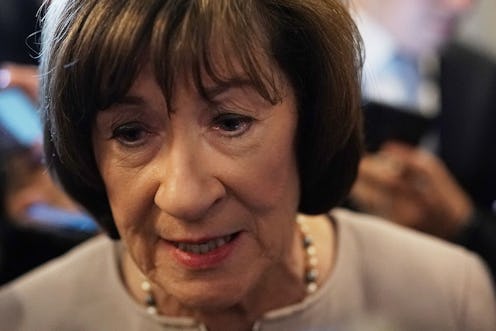News
Susan Collins Just Gave An Update On How She Feels About Her Kavanaugh Vote Now

On Monday, the Republican senator who provided a pivotal yes vote for Brett Kavanaugh's Supreme Court confirmation gave an update on how she feels about her decision. Susan Collins said Kavanaugh's latest SCOTUS move vindicated her from the criticism she received after voting in favor of his confirmation. Collins, who's one of two pro-choice Republicans currently serving in the Senate, was the senator who tipped Kavanaugh's vote number to victory. And based off her conversation with reporters on Monday, it looks like she doesn't regret her decision.
Earlier in the day, the Supreme Court had decided not to take two cases concerning the potential defunding of Planned Parenthood. Both Kavanaugh and a fellow conservative member of the bench, Chief Justice John Roberts, sided with the liberal faction of the court, voting not to add either case to the court's docket.
Kavanaugh's potential threat to Roe v. Wade was heavily discussed and debated in the months leading up to his confirmation hearing. In October, when Collins gave her speech explaining why she was going to vote for Kavanaugh's confirmation, she confirmed that she didn't believe Kavanaugh posed any threat to reproductive access and care in the United States.
She said, “To my knowledge, Judge Kavanaugh is the first Supreme Court nominee to express the view that precedent is not only a practice and a tradition, but rooted in Article 3 of our constitution itself."
To be clear, the SCOTUS decision in no way required the judges to make direct statements on their opinions of Roe. Rather, it was a specific decision made about whether or not two cases (which raised the issue of whether states have the right to terminate Medicaid contracts with Planned Parenthood affiliates who offer care to low-income women) deserved to be heard by the Supreme Court.
To CNN, Elizabeth Wydra, president of the Constitutional Accountability Center, said, "Sen. Collins is wrong to think that Kavanaugh's vote on Monday signals any support whatsoever for Roe v. Wade."
Wydra continued, "The case had nothing to do with abortion, Kavanaugh's apparent vote not to hear this particular case does nothing to vindicate Sen. Collins vote for Justice Kavanaugh. Sen. Collins' should not breathe a sigh of relief until Kavanaugh squarely votes to support Roe."
Brigitte Amiri of the ACLU reflected a similar sentiment to New York Magazine. She said, “I don’t think this is a harbinger of what’s to come. To the extent that people are saying that this shows where the Supreme Court, newly configured, is going to be on access to abortion questions, this case does not present that.”
The Supreme Court has largely upheld the tenets of Roe since the landmark 1973 ruling. The most recent abortion-related ruling occurred in 2016, when SCOTUS struck down several restrictions on abortion clinics and providers in Texas.
Throughout his confirmation hearing, Kavanaugh maintained that Roe was "important precedent," and that he had no intention of becoming entangled with it. However, previous legal memos written by Kavanaugh revealed that the federal judge believed that not "all legal scholars refer to Roe as the settled law of the land at the Supreme Court level since Court can always overrule its precedent."
At his hearing, Kavanaugh said, "As a general proposition I understand the importance of the precedent set forth in Roe v. Wade." Only time will tell whether he will abide by this principle.